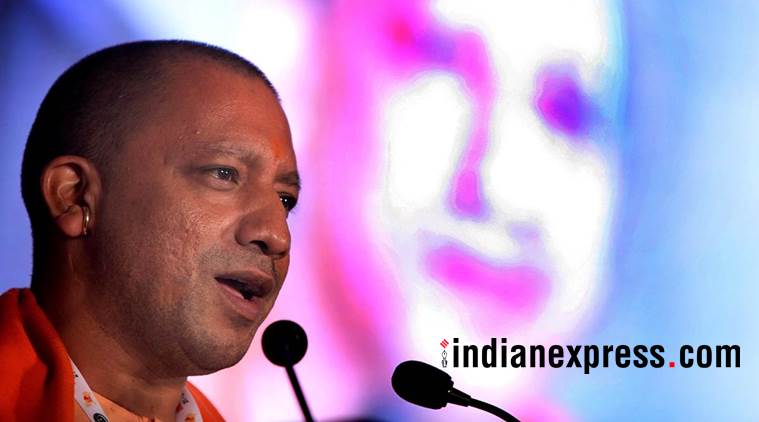Two inequalities
Uttar Pradesh CM Yogi Adityanath's talk of Dalit reservations in Jamia, AMU, misunderstands nature of minority institutions

UP chief minister Yogi Adityanath. (Express Photo by Pradip Das/Files)
As a social document, the Indian Constitution mandates special provisions in favour of the underprivileged. The Hindu right rejected the Constitution and its liberal values and has not been an enthusiastic supporter of SC/ST reservations. In 2015, during the Bihar elections, RSS chief Mohan Bhagwat called for a review of the reservation policy. Anticipating electoral losses in caste-ridden Bihar, the BJP quickly distanced itself from the statement of the RSS chief.
After by-election defeats, UP Chief Minister Yogi Adityanath, in an effort to break Dalit-Muslim unity, has raised the issue of SC/ST reservations at Aligarh Muslim University (AMU) and Jamia Millia Islamia (JMI). The Modi government, in spite of promises by Union minister Ram Vilas Paswan, neither brought an ordinance to undo the March 20 controversial judgment of the apex court on atrocities against SCs/STs, nor showed any inclination of overturning the regressive judgment of Allahabad High Court in Vivek Tiwari (2017) on reservations in universities or judgments on reservations in promotions. Dalit atrocities in BJP-ruled states are widespread and therefore it is difficult to accept that Yogi made this statement out of any real concern for Dalits. Gujarat has the highest incidence of such atrocities and its conviction record is six times lower than the national average.
As per governmental policy, there must be 15 per cent reservations for SCs and 7.5 per cent for STs in government universities. But today only seven of 100 teachers in colleges and universities are from the underprivileged sections. Only 1,02,000 — or 7.22 per cent — of the 1.4 million teachers were Dalits in 2016. The ST faculty members were just 30,000 or a meagre 2.12 per cent. If Yogi is sincere towards the Dalit cause, he must immediately order the filling of all vacant reserved positions in the universities under the administrative control of his government. AMU and JMI being central institutions are concerns of the central government. By the way, BHU has an extremely poor record in filling reserved positions.
The chief minister must be aware of the constitutional provision on the exemption of minority institutions from reservations. His purpose is simply to polarise and rally together upper caste Hindus. But he does not appreciate that such reservations in minority institutions will eventually hurt the interests of upper caste Hindus who get the lion’s share of the general seats.
Article 30 of the Indian Constitution permits religious and linguistic minorities to establish and administer the educational institutions of their choice. Since minorities are defined at the state level, Yogi should know that Hindus, too, as a linguistic minority are entitled to Article 30 rights. A Hindi medium institution in Tamil Nadu established by the Hindus of UP will be a linguistic minority institution. Hindus are also a religious minority in a few states.
Article 15(5) of the Constitution says that minority institutions under Article 30 shall be exempt from constitutional reservation. This amendment was inserted in 2005 by the 93rd constitutional amendment that was not opposed by the BJP. Of the 381 Lok Sabha members who were present in the House, 379 had supported this amendment. The amendment brought in by the BJP’s Vijay Kumar Malhotra for dropping the exemption of minority institutions got just 110 votes as 272 members voted against it. The constitutional validity of the amendment was upheld by the five-judge bench of the Supreme Court in Ashok Thakur (2008). The court said that the exemption of minority educational institutions from the ambit of reservations is constitutionally valid as such institutions are a class by themselves and cater to the special needs of minorities. Their exemption is thus not violative of the right to equality.
The Supreme Court has held minority rights as the basic structure of the Constitution and therefore these rights cannot be taken away even by constitutional amendments. The Supreme Court held in Aziz Basha (1968) that the term “educational institution” in Article 30 includes a “university” and thus there can be minority universities. We have a number of minority universities established by Muslims, Christians, Jains etc. The apex court in Kerala Education Bill (1957) explicitly held, and in TMA Pai Foundation (2003) its 11-judge bench reiterated, that a minority institution is primarily for the minority that has established it and there shall be “only sprinkling of outsiders” to ensure the dissemination of a minority culture to those outsiders.
The court has consistently held that governmental “aid” cannot come “with such restrictions which will destroy or annihilate the minority character of such institutions”. That AMU or JMI receive governmental “aid” has no effect whatsoever on their minority character. In the case of AMU, there is a stay order of the apex court on the 2005 decision of Allahabad HC and therefore till the SC finally determines its minority character, no change in its reservation policy is legally possible. As far as the JMI is concerned, the National Commission of Minority Educational Institutions (NCMEI) has recognised it as a minority institution. A few weeks back, the apex court in Sisters of St Joseph of Cluny (2018) held that the NCMEI has the jurisdiction to declare the minority character of educational institutions. Minority institutions are like private institutions that have been established by the minorities primarily for the education of the concerned minority. They invest their resources, their land and money in establishing such institutions.
Till 2003, as per St. Stephen’s (1991), minority institutions were allowed to reserve only 50 per cent seats in favour of the minority that has established such an institution. TMA Pai (2003) lifted the upper limit of 50 per cent. Thus now minority institutions may have more than 50 per cent reservations in favour of minorities depending upon the course and needs of the minority community. Assuming in a minority university, there is just 50 per cent reservation for the concerned minority, now if 22.5 per cent SC/ST reservations and 27 per cent OBC reservations is also provided in such an institution, only 0.5 per cent seats will be left for the general candidates. Since the Supreme Court has said that 50 per cent seats should always remain available to the general candidates, SC/ST reservations was made inapplicable to minority institutions. The 93rd amendment thus was to comply with the apex court’s order in TMA Pai.
There is no Muslim reservation in AMU. It already has more than 45 per cent or so Hindus in its prestigious courses like medicine or engineering. If Yogi really cares for Dalits, let him force the BJP to implement Dalit reservations in the private sector. Meanwhile, let AMU and JMI make special efforts to increase SC/ST representation so that societal diversity is reflected in these institutions.
The writer is vice chancellor, NALSAR University of Law, Hyderabad. Views are personal
For all the latest Opinion News, download Indian Express App
More From Faizan Mustafa
- Who is a citizen — in Assam, India?Citizenship is a complicated idea with exclusion at its core. In Assam, which shares a border with Bangladesh and has faced illegal migration for decades,…
- Broken PromiseRepresentation, affirmative action are being diluted by UGC. Government must act...
- The question of discretionAs SC continues to hear today the Cong-JD(S) appeal against Karnataka Governor Vajubhai Vala’s decision to call B S Yeddyurappa to form the government, an…








































No hay comentarios:
Publicar un comentario